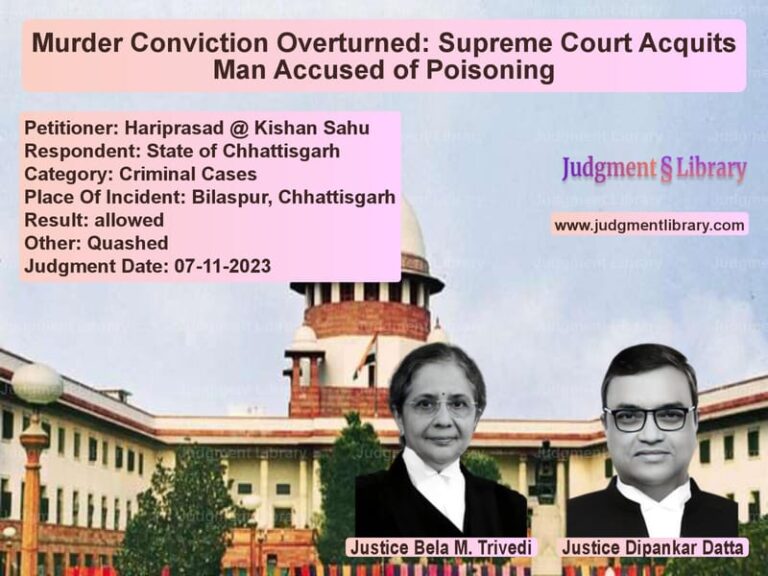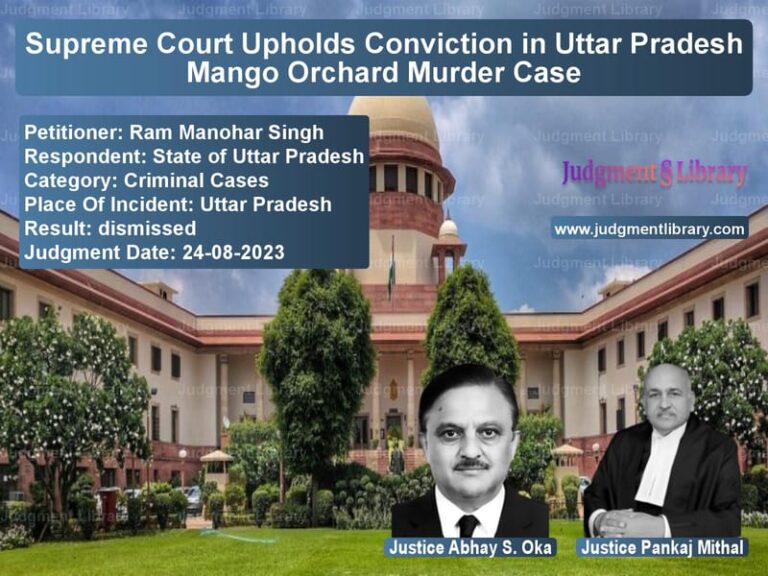Supreme Court Remands Case on Dowry Harassment Allegations for Fresh Consideration
The case of Geeta & Ors. vs. State of Uttar Pradesh & Anr. centered around an appeal challenging the Allahabad High Court’s dismissal of the appellants’ application under Section 482 of the Code of Criminal Procedure (CrPC). The case involved allegations under Section 498A of the Indian Penal Code (IPC) related to dowry harassment.
The Supreme Court had to determine whether the High Court erred in dismissing the appellants’ application without adequately considering the factual background. The judgment emphasized the necessity of providing detailed reasoning in judicial decisions, especially in criminal matters involving serious accusations.
Background of the Case
The appellants were accused in a dowry harassment case registered at Police Station Dhanuara, District Amroha, Uttar Pradesh. The criminal proceedings were initiated following a complaint that alleged persistent cruelty for dowry, leading to mental and physical harassment.
Seeking to quash the charge sheet and the entire criminal proceedings, the appellants filed an application under Section 482 CrPC before the High Court. However, the High Court dismissed their plea without engaging in a detailed examination of the case’s merits.
Key Legal Issues
- Whether the High Court sufficiently considered the facts before dismissing the appellants’ application.
- Whether the allegations in the complaint and FIR were sufficient to warrant the continuation of criminal proceedings.
- Whether procedural fairness was upheld in the High Court’s decision.
Petitioners’ (Appellants’) Arguments
The appellants contended that the High Court had dismissed their application without addressing the nature of the allegations and the available evidence. Their legal counsel argued:
“The High Court merely cited legal principles without delving into the specific factual background of the case, making it impossible to determine whether the dismissal was justified.”
The appellants also asserted that they had been falsely implicated and that the allegations did not establish a prima facie case necessitating a trial.
Respondents’ (State of Uttar Pradesh) Arguments
The respondents justified the High Court’s ruling, stating:
“The allegations against the accused are serious in nature and involve dowry harassment, which requires trial and should not be quashed at a preliminary stage.”
The State argued that the complaint contained sufficient material to proceed with the criminal trial and that the High Court had rightly refused to interfere.
Supreme Court’s Observations
The Supreme Court, presided over by Justices Abhay Manohar Sapre and Indu Malhotra, found that the High Court failed to provide adequate reasoning in its dismissal order. The Court noted:
“The Single Judge has only quoted the principles of law laid down by this Court in several decisions relating to powers of the High Court on the issue of interference in cases filed under Section 482 of the Code but has failed to even refer to the facts of the case.”
The Court further emphasized:
“The learned Judge ought to have first set out the brief facts of the case with a view to understand the factual matrix and then examined the challenge made to the proceedings in light of the principles of law.”
Final Judgment
Finding procedural deficiencies in the High Court’s order, the Supreme Court ruled:
“The case is remanded to the High Court (Single Judge) with a request to decide the application afresh on merits in accordance with law, keeping in view the aforementioned observations.”
The Court clarified that it was not expressing any opinion on the merits of the case but was ensuring a fair and thorough review before reaching a conclusion.
Significance of the Judgment
- Ensuring Judicial Fairness: The ruling underscores the importance of detailed reasoning in criminal judgments.
- Protection Against Arbitrary Dismissal: The judgment prevents Section 482 applications from being dismissed without adequate examination.
- Clarity in Legal Proceedings: By remanding the case, the Supreme Court ensured the appellants’ claims would be properly heard and assessed.
Conclusion
The Supreme Court’s decision highlights the necessity of procedural fairness in criminal matters. The ruling reinforces the requirement for high courts to engage with both factual and legal aspects of cases before issuing dismissals. This judgment serves as a precedent for upholding detailed judicial reasoning in future cases.
Petitioner Name: Geeta & Ors..Respondent Name: State of Uttar Pradesh & Anr..Judgment By: Justice Abhay Manohar Sapre, Justice Indu Malhotra.Place Of Incident: Amroha, Uttar Pradesh.Judgment Date: 03-12-2018.
Don’t miss out on the full details! Download the complete judgment in PDF format below and gain valuable insights instantly!
Download Judgment: Geeta & Ors. vs State of Uttar Prade Supreme Court of India Judgment Dated 03-12-2018.pdf
Direct Downlaod Judgment: Direct downlaod this Judgment
See all petitions in Dowry Cases
See all petitions in Domestic Violence
See all petitions in Judgment by Abhay Manohar Sapre
See all petitions in Judgment by Indu Malhotra
See all petitions in allowed
See all petitions in Remanded
See all petitions in supreme court of India judgments December 2018
See all petitions in 2018 judgments
See all posts in Criminal Cases Category
See all allowed petitions in Criminal Cases Category
See all Dismissed petitions in Criminal Cases Category
See all partially allowed petitions in Criminal Cases Category







